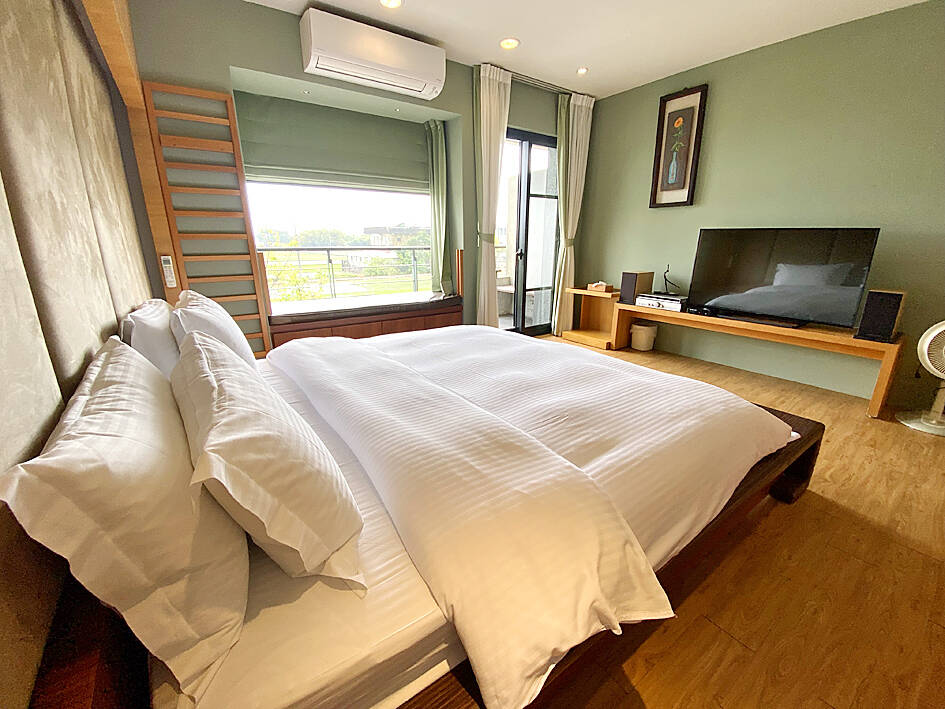The hospitality sector and ports could soon apply to hire migrant workers, provided they increase the monthly salary of their lowest-paid domestic workers by NT$2,000 (US$65.30) for every foreign worker hired, according to new migrant worker policies to be finalized at a Cabinet meeting today.
The 50 percent cap on the proportion of migrant workers hired would remain in place.
The policies are expected to be implemented next year, and are designed to protect the jobs and livelihoods of domestic workers.

Photo: Tsai Yun-jung, Taipei Times
Premier Cho Jung-tai (卓榮泰) in a meeting with a manufacturers’ association on Oct. 16 said the government would shortly be releasing a comprehensive national workforce review.
The new policies would increase the number of migrant workers entering Taiwan, and shorten the processing time for applications to support the needs of businesses and families, he said.
No further information has been released regarding foreign domestic workers after President William Lai (賴清德) last month pledged to allow families with at least one child up to age 12 apply for a foreign domestic helper.
Currently, the policy is limited to families with two children younger than six.
The proposal is reportedly still being reviewed and would not be included in the new policy plan.
As of the end of August, Taiwan had 854,000 migrant workers, which might increase by 10,000 to 20,000 once hiring regulations are relaxed for hotels and ports.
Moreover, the Ministry of Labor is to allocate more than NT$80 million next year to establish a foreign worker recruitment center, which would send personnel abroad to recruit and train foreign technical workers.
The program would begin in the Philippines before expanding to Vietnam, Indonesia and Thailand, the ministry said.
It aims to ensure direct recruitment to prevent the exploitation of migrant workers, it added.

Taiwan has received more than US$70 million in royalties as of the end of last year from developing the F-16V jet as countries worldwide purchase or upgrade to this popular model, government and military officials said on Saturday. Taiwan funded the development of the F-16V jet and ended up the sole investor as other countries withdrew from the program. Now the F-16V is increasingly popular and countries must pay Taiwan a percentage in royalties when they purchase new F-16V aircraft or upgrade older F-16 models. The next five years are expected to be the peak for these royalties, with Taiwan potentially earning

STAY IN YOUR LANE: As the US and Israel attack Iran, the ministry has warned China not to overstep by including Taiwanese citizens in its evacuation orders The Ministry of Foreign Affairs (MOFA) yesterday rebuked a statement by China’s embassy in Israel that it would evacuate Taiwanese holders of Chinese travel documents from Israel amid the latter’s escalating conflict with Iran. Tensions have risen across the Middle East in the wake of US and Israeli airstrikes on Iran beginning Saturday. China subsequently issued an evacuation notice for its citizens. In a news release, the Chinese embassy in Israel said holders of “Taiwan compatriot permits (台胞證)” issued to Taiwanese nationals by Chinese authorities for travel to China — could register for evacuation to Egypt. In Taipei, the ministry yesterday said Taiwan

Taiwan is awaiting official notification from the US regarding the status of the Agreement on Reciprocal Trade (ART) after the US Supreme Court ruled US President Donald Trump's global tariffs unconstitutional. Speaking to reporters before a legislative hearing today, Premier Cho Jung-tai (卓榮泰) said that Taiwan's negotiation team remains focused on ensuring that the bilateral trade deal remains intact despite the legal challenge to Trump's tariff policy. "The US has pledged to notify its trade partners once the subsequent administrative and legal processes are finalized, and that certainly includes Taiwan," Cho said when asked about opposition parties’ doubts that the ART was

If China chose to invade Taiwan tomorrow, it would only have to sever three undersea fiber-optic cable clusters to cause a data blackout, Jason Hsu (許毓仁), a senior fellow at the Hudson Institute and former Chinese Nationalist Party (KMT) legislator, told a US security panel yesterday. In a Taiwan contingency, cable disruption would be one of the earliest preinvasion actions and the signal that escalation had begun, he said, adding that Taiwan’s current cable repair capabilities are insufficient. The US-China Economic and Security Review Commission (USCC) yesterday held a hearing on US-China Competition Under the Sea, with Hsu speaking on